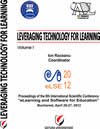SUPPORTING SCHOOL COUNSELLING INTERVENTIONS THROUGH THE USE OF WEB 2.0 TECHNOLOGIES
SUPPORTING SCHOOL COUNSELLING INTERVENTIONS THROUGH THE USE OF WEB 2.0 TECHNOLOGIES
Author(s): Petre BotnariucSubject(s): Education
Published by: Carol I National Defence University Publishing House
Keywords: e-learning; e-guidance and counselling; web 2.0 technologies; collaborative learning
Summary/Abstract: The article presents the results of a research run by the Institute of Education Sciences – Department of Educational Counselling and Management in 2011 on the integration of the ICT tools in the activity of the guidance counsellors from different schools around the country. The article starts with a short overview of the way the web 2.0 tools are used in guidance counselling in other countries and what expectations are set for these new tools. Then the data collected on the use of web 2.0 tools are presented and analysed against the role of the guidance counsellors in the school context. The research involved a number of practitioners in the field of career guidance in a training course with a pre- and post- self-assessment of their different ICT competences related to the guidance tasks. The aim was to identify how good are the counsellors in assessing and improving their ability to use wiki pages (wikipedia, google docs, other wiki sites) to support a group of pupils creating a wiki project on study and employment opportunities, creating a thematically blog on a specific topic, helping pupils to participate in online decision making groups through web 2.0 tools, collaborating with other practitioners at national or international level in order to build a database with relevant information and teaching certain counselling related topics, using content management tools or self-assessment online interest/ skills questionnaires (ie. surveymonkey). The article ends with a set of specific recommendations for stakeholders in the national education system and new research and development areas to be approach forward.
Journal: Conference proceedings of »eLearning and Software for Education« (eLSE)
- Issue Year: 8/2012
- Issue No: 01
- Page Range: 38-43
- Page Count: 6
- Language: English

